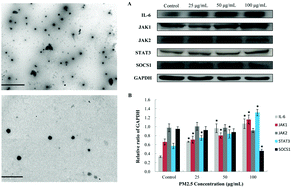Fine particulate matter induces vascular endothelial activation via IL-6 dependent JAK1/STAT3 signaling pathway
Abstract
Exposure to PM2.5 has been strongly linked to endothelial dysfunction. However, the underlying mechanism of PM2.5 on the vascular endothelial function is poorly understood. This study examined the toxic effect and underlying mechanism of PM2.5 on human umbilical vein endothelial cells (HUVECs). Decreased cell viability and increased LDH activity were observed in the PM2.5-treated HUVECs in a dose-dependent manner. The production of ROS, MDA, and the inhibition of SOD activity were also triggered by PM2.5 in HUVECs. In addition, PM2.5 increased the intracellular levels of proinflammatory cytokines (IL-6, TNF-a, IL-1β, IL-8 and CRP), cell adhesion molecules (ICAM-1, VCAM-1) and tissue factor (TF), resulted in endothelial activation. For an in-depth study, the protein levels of IL-6, JAK1 and STAT3 were up-regulated significantly, while the expression of JAK2 and SOCS1 were down-regulated gradually in PM2.5-treated HUVECs in a dose-dependent manner. These results show that PM2.5 triggered endothelial activation via upregulation of the IL-6 dependent JAK1/STAT3 signaling pathway. This will provide new insights into the toxic effects and mechanisms of cardiovascular diseases triggered by ambient air pollution.


 Please wait while we load your content...
Please wait while we load your content...